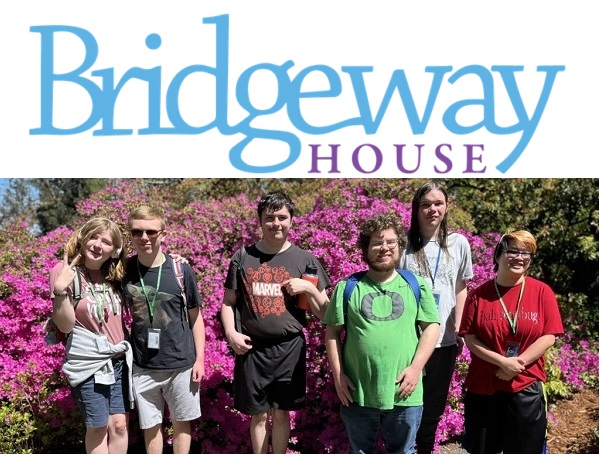Stories of Bridgeway House: Sean Remington
3 min read
Presenter: Anthony has been attending school at Bridgeway for the past 10 years. We visited with his father, Sean Remington, and asked how he first learned about Bridgeway.
Sean Remington: I think we just sought community because we had had diagnoses and you know, we have the internet and so we were online and we were looking and, and everything pointed to Bridgeway and Patricia and just, ‘This is the place for our little guy.’
I mean, scholastically and academically, I mean, that’s all good, but the social stuff and just raising him, letting him grow up, and giving him a place where he is accepted and understood, and that’s belonging, is like the most important thing, right? So he’s found a place where he belongs.
[00:00:48] I think he was maybe first grade…? We had three months of kindergarten and then he went to the Child Center for a bit of time until we transitioned into Bridgeway. And I mean, he has friends now that have since graduated Bridgeway that are 20 years old, and he’s been best of friends with him since he was six.
[00:01:09] And, the continuity, I mean, there’s been new teachers and new students, but also the same core people. I mean, I’ve known them now for the same 10 years.
[00:01:19] And I, for the longest time I was working swing shift and I was sleeping three and a half, four hours a night and driving him every day to Upper Camp Creek because I couldn’t put him on the bus.
[00:01:35] I didn’t feel safe to let him go. And some of that was my own thing, but some of it was: He’s my guy and I didn’t have people I could trust, and that changed in a lot of ways, having my son without a doubt in good hands.
[00:01:52] I think there’s two schools in all of Oregon. Maybe it’s different now, but at one time there was two schools that specialize in autism and it’s one in 40 kids now being diagnosed with spectrum disorder, that just is: ‘No, that doesn’t cut it.’
[00:02:11] I just think about myself and so many other people that later on in life are understanding and realizing the spectrum—what it is, how it is, and also the prevalence of it. And there were people I know, myself included, growing up, that were treated with or for behavioral issues and it was just a lot of misconstruing who we are, at our core of who we are, right. And that was very painful to me, and I’m seeing it with other people, right?
[00:02:45] Public school can’t get it done for neurotypical kids. They can’t even scratch the surface on how to connect to our kids on the spectrum. They don’t have the understanding, resources, ability, or willingness, whatever the case, it’s not there.
[00:03:02] I mean, that’s everything, you know? You got a bunch of kids growing up not understanding who they are and not being accepted, and they’re not going to accept themselves, and that’s just no place to thrive.
[00:03:13] It’s literally, I mean, it’s everything. It’s the difference of life and death and just surviving miserably and misunderstood. And that’s just, I mean, it happens. And people live their life like that and they don’t have to.
[00:03:29] Presenter: We’re listening to stories of Bridgeway House this Autistic Pride Day, June 18, and learning about this amazing and irreplaceable community resource, this school that serves 90 families from 17 school districts. You can learn more and donate at their website, BridgewayHouse.org, or call (541) 345-0805.
During summer break, calls to Bridgeway House will be automatically transferred to school admin team cell phones. For faster service, call the cell phones directly: (541) 743-5159 and (505) 930-6910.




